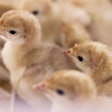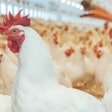There is to be a review of the legislation covering the Egyptian poultry sector aimed at expanding output in future, Khalid Tawfik, the head of the Animal Production and Poultry sector in the Ministry of Agriculture, announced at a meeting this week.
Among the challenges being experienced by the sector that were raised at the event were avian influenza and other poultry diseases, rising imports, high feed prices and the transfer of farms out of towns and cities.
Tawfik presented his vision to develop the wealth of the poultry sector at a conference entitled “Expert guide: The challenges and opportunities for Egypt’s Poultry Industry”, reports Daily News Egypt.
Moustafa Sakr, head of the “Business News” Foundation, said that the poultry industry is important for national security, and called for its leaders to discuss their challenges, which include outbreaks of avian influenza since 2006. It is important for the government to understand the market and the issues facing the sector, he added.
Egypt’s poultry industry has lost 60 percent of its profits over the last 10 years, according to World Federation of Poultry executive and head of the Lebanese Union of Poultry, Musa Freiji.
Freiji highlighted the increase in imports of poultry meat that followed the reduction in customs tariff from 60 percent to 30 percent. This has harmed domestic producers, and he called for the tariff to be raised again as well as a tightening up of import procedures so documents cannot be falsified.
Despite global developments to maintain the efficacy of vaccines, Freiji said that the Ministry of Agriculture must take further measures to address the poultry disease health crisis, including the removal of poultry from residential areas, a factor that has contributed to the spread of avian influenza in the country.
Tawfik said he would take these issues into account as he considers how best to help advance the poultry industry.
Feed price impact on poultry industry
To address the challenge of the high prices of feed ingredients such as corn and soybeans, the ministry has developed a plan to achieve self-sufficiency in corn by 2018. Egypt currently imports about 7.2 million metric tons (mmt) of yellow corn in addition to its domestic production of about 6.5mmt. Poultry feed comprises 60 percent corn.
Poultry disease in Egpyt
To tackle the disease situation, Tawfik said his ministry has been working with national and international agencies to procure vaccines to control 42 poultry diseases. Among the challenges is that 60 percent of poultry farms are unlicensed and concentrated in the Delta and Valley regions.
Available land for poultry proeduction
Deputy Head of the financial assistance committee at the Ministry of Supply, Mohammed Badr, undertook to discuss the demands of the poultry farm owners with the Minister, Khaled Hanafi, and to ensure more land is made available in desert areas for poultry farms. He added that the ministry is also encouraging investment in both small and large poultry ventures.
Mohamed ElShafie, one of the attendees at the conference, claimed the government has already allocated approximately 180,000 acres of desert land for the transfer of poultry farms. However, he said, companies have been unable to move due to a lack of infrastructural development in those areas.
According to the statistics service of the United Nations’ Food and Agriculture Organization, FAOstat, Egypt produced more than 953,000 metric tons of poultry meat in 2013, the latest year for which figures have been published. Output appears to have increased steadily over the previous two decades.

















